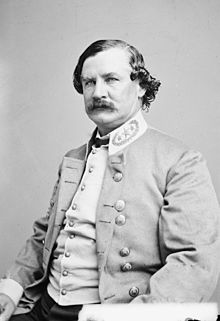Benjamin Franklin Cheatham
Benjamin Franklin Cheatham (born October 20, 1820 in Nashville , Tennessee , † September 4, 1886 ibid) was a farmer, gold mine owner in California and major general in the Confederate Army .
Life
Cheatham was born in Nashville in 1820. When the Mexican-American War broke out in 1846, he went to the 1st Tennessee Infantry Regiment with the rank of captain. In 1848, at the end of the war, he was in command of the 3rd Tennessee Infantry Regiment when he retired. In 1849 he moved to California, attracted by the gold rush . In 1853 he returned to Nashville, working as a planter and serving as a brigadier general in the Tennessee Militia .
After the outbreak of the civil war , he joined the Confederate Army on May 9, 1861, was accepted as a brigadier general due to his military experience and was given command of a brigade in the west of the district under Major General Leonidas Polk . He had his first test on November 7th of the same year in the action at Belmont , Missouri , when he led three brigades from General Gideon Johnson Pillows Division against the Union forces under Ulysses S. Grant , which was judged a victory by the Confederates. In December he was honored by Congress for this success and promoted to major general on March 10, 1862. He was appointed commander of the 2nd Division of the Mississippi Army . In the following years he led the division in the Battle of Shiloh on April 6 and 7, 1862, in which he was wounded.
When General Braxton Bragg took command of the army, Cheatham followed him in the Battle of Perryville and from December 31, 1862 to January 2, 1863 in the Battle of the Stones River and the Battle of Chickamauga on September 19 and 20, 1963 He was then appointed Commanding General on September 29, 1863 . When Bragg was defeated by Grant in the Battle of Chattanooga from November 23 to 25, 1863 , Cheatham secured the right flank and was able to prevent further advance of the Union troops towards the end of the battle.
In 1864 he fought in the Atlanta campaign under General Joseph E. Johnston and later under Lieutenant General John Bell Hood and at the Battle of Ezra Church , where he was wounded. Cheatham was commanding general during the battles around Atlanta , replacing General William Joseph Hardee , who resigned when Hood took over command.
After the war ended, Cheatham turned down US President Grant's offer to fill a state position in a federal agency, and in 1872 ran unsuccessfully for a seat in the United States House of Representatives . As a Democrat, he was defeated by the Republican Horace Maynard . He then served as superintendent in Tennessee State Prison for four years before serving as postmaster of Nashville from 1885 until his death on September 4, 1886.
Cheatham's son, Benjamin Franklin Jr., Major General in the US Army and served in the Spanish-American War and the First World War .
See also
literature
- David J. Eicher: The Civil War in Books: An Analytical Bibliography . University of Illinois, 1997, ISBN 0-252-02273-4 .
- Richard N. Current: Encyclopedia of the Confederacy . 1993, 4 vol., ISBN 0-13-275991-8 .
- John H. Eicher, David J. Eicher: Civil War High Commands . Stanford University Press, 2001, ISBN 0-8047-3641-3 .
- Ezra J. Warner: Generals in Gray: Lives of the Confederate Commanders , Louisiana State University Press, 1959, ISBN 0-8071-0823-5 .
- Christopher Losson: Tennessee's Forgotten Warriors: Frank Cheatham and His Confederate Division . Knoxville, TN 1989. (Cheatham's only published biography.)
Web links
- Benjamin F. Cheatham in the database of Find a Grave (English)
| personal data | |
|---|---|
| SURNAME | Cheatham, Benjamin Franklin |
| BRIEF DESCRIPTION | Goldmine owner and Confederate General in the American Civil War |
| DATE OF BIRTH | October 20, 1820 |
| PLACE OF BIRTH | Nashville , Tennessee |
| DATE OF DEATH | 4th September 1886 |
| Place of death | Nashville , Tennessee |
